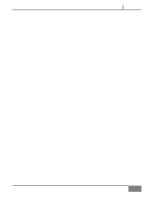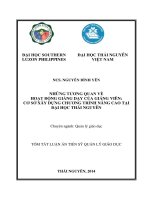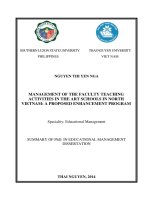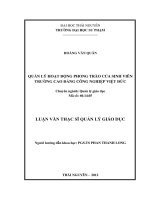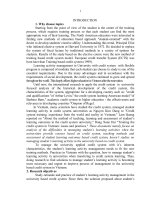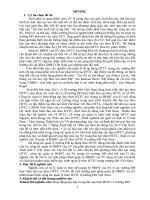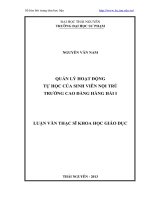Tom tat tieng viet quản lý hoạt động giảng dạy của giảng viên trong các trường nghệ thuật ở phía bắc việt nam cơ sở đề xuất một chương trình nâng cao
Bạn đang xem bản rút gọn của tài liệu. Xem và tải ngay bản đầy đủ của tài liệu tại đây (298.42 KB, 26 trang )
SOUTHERN LUZON STATE UNIVERSITY
PHILIPPINES
THAI NGUYEN UNIVERSITY
VIET NAM
NGUYEN THI YEN NGA
MANAGEMENT OF THE FACULTY TEACHING
ACTIVITIES IN THE ART SCHOOLS IN NORTH
VIETNAM: A PROPOSED ENHANCEMENT PROGRAM
Speciality: Educational Management
SUMMARY OF PhD. IN EDUCATIONAL MANAGEMENT
DISSERTATION
THAI NGUYEN, 2014
2
The Ph.D. in Educational Management program is held at:
INTERNATIONAL TRAINING CENTER (ITC), COLLEGE OF
AGRICULATURE AND FORESTRY - THAI NGUYEN
UNIVERSITY
Scientific supervisor: Prof. Dr. Walberto A. Macaraan
Proofreader 1:…………………………………………….
Proofreader 2:…………………………………………….
Proofreader 3:…………………………………………….
The PhD dissertation is defended to the Panel of Examiners at
Thai Nguyen University on ………(dd/mm/yy)……………….
The dissertation can be found at:
- Vietnam national library;
- Learning Resource Center, Thai Nguyen University;
- Library of the International Training Center, College of Agriculture
and Forestry - Thai Nguyen University;
- Library of Southern Luzon State University, Philippines.
3
Chapter I. INTRODUCTION
In the globalization and economic integration in Vietnam, the
use of human resources becomes a challenge for the mankind.
Faculties and teaching staff have special role in the education, are
determinant factor for the quality and efficiency of education.
Teaching process has been seen as the mean for learning quality
management.
Evaluation of faculty’ teaching activity is the key to probe into
faculty quality to help faculty ascertain their shortcomings so that
they can not only improve themselves but also increase their teaching
effectiveness.
Resolution No.14/2005/NQ-CP dated November 2, 2005 by
Government of Vietnam on Substantial and comprehensive renewal
of Vietnam's tertiary education in the 2006-2020 period affirmed:
“To build up a sufficient contingent of tertiary education lectures and
administrators, who have ethical quality and professional conscience,
high professional qualifications and an advanced teaching and
management style”. Student evaluation of teaching has been a
compulsory practice of institutional quality evaluation since the
academic year 2009-2010.
Many Vietnamese scientists have studied this issue, such as the
research: Master Pham XuanThanh, Quality of Postgraduate Training
in Vietnam: Definition, Criteria and Mesurement scales; Nguyen
Phuong Nga (2007): "Student faculty evaluations - testing and
modeling tools" National University Publishing House Hanoi;… In
general, these studies are macro without deep research on evaluation
4
of faculty teaching activities, especially in art schools in Vietnam.
Therefore, improving the quality of teaching is background to
improve the quality training in art schools is necessary now; this
study makes this research even more imperative in Vietnam now.
1. BACKGROUND OF THE STUDY
The evaluation of the quality of teaching can be done with
different tools. It is possible that the survey questionnaire, interview
questions, observation sheets
Traditional arts are part of the cultural heritage of a group of
people whose members share a common ethnic heritage, language,
religion, occupation, or geographic region. These artistic traditions
are passed down through generations and reflect the values of their
shared culture. Skills are typically learned directly through
observation and imitation from someone steeped in the tradition,
rather than through classes, books, or other means of institutional
instruction.
Evaluation of teaching in art schools there are some differences:
the teaching and learning environment characteristics, the level of
awareness, gender, ethnicity, therefore evaluate teaching in art
schools have constraints but the evaluation of teaching is an
inevitable trend, which is a mandatory, teaching art schools need
comprehensive preparation of theory and practice to ensure improved
training.
In order to effectively improve teaching quality, art schools has
put a lot of continuous effort into studies related to facultys’ teaching
effectiveness. However, there is no complete system in Vietnam
5
which can be used as a tool to evaluate faculty’ teaching to improve
the quality training of art school.
Based on this background, the researcher intends to find other
processed to evaluation of faculty teaching activities to improve the
quality training of art school in Vietnam.
2. OBJECTIVES OF THE STUDY
The main purpose of this was the evaluation of faculty teaching
activities to improve the quality training of art school in Vietnam
with a view to the development of quality training schools of art in
Vietnam in the period 2013 – 2020.
Specifically it aimed to answer the following:
2.1. Assess the teaching activities of teachers from the point of
views of respondents in terms of:
2.1.1 Teaching Plan and Preparation
2.1.2. Management of the Program
2.1.3. Teaching time management
2.2. Assess the teaching activities of the teachers from the point
of views of student respondents in terms of:
2.2.1. Professional Competencies on the Program
2.2.2. Methods and Teaching Skills of Teachers
2.2.3. Peers and Student Relations
2.2.4. Learning outcome assessment test
6
2.3. Ascertain if there is significant difference among the two
group of respondents (Teachers and Administrators)
2.4. Ascertain if there is significant difference among the
students perception of the 5 respondent schools
2.5. Find out the problems encountered in the management of
teaching activities among
2.5.1. Teachers
2.5.2. Administrator
2.5.3. Students
2.6. Develop an enhancement program
3. HYPOTHESIS
3.1. There is no significant difference in the point of views of
the two group of respondents as to teaching activities of teachers.
3.2. There is no significant difference among students of the 5
respondent schools.
4. SIGNIFICANCE OF THE STUDY
This study attempting of evaluation of faculty teaching activities
to improve the quality training of art school the north in Vietnam
would be beneficial to the following:
4.1. Schools: oriented and mission to perform of the program;
improvement within the school; establishes a check and balance
system for the evaluation process; To bring new perspectives to arts
curriculum in the schools and to provide experiences through
programs that cultural exchanges; to promote school effectiveness
7
and efficiency; fostering productive work environments;
improvement of the school's ability to accomplish its mission.
4.2. Administrators: Have evaluation plan for the development
strategy; identifies ways to reach higher standards and correct
significant discrepancies; Understanding and organizing subject
matter for learning; annual evaluation of faculty; Oversees faculty
evaluation process within school.
4.3. Faculty: Improvement purpose reflects the need for
professional growth and development of the individual faculty;
contributing to the personal goals of the faculty; provides a
systematic opportunity for individual skill enhancement; enhanced
self-expectations; increases the likelihood of changes in teaching
performance; develop strategies to integrate the arts into facultys
daily classroom instruction.
4.4. Students: To enhance perception, appreciation of the arts,
and abilities to express themselves creatively; Engaging and
supporting all students in learning.
4.5. Future Researchers: Developing as a professtional
educator. Planning instruction and designing learning experiences for
all students of art schools.
5. SCOPE AND LIMITATIONS OF THE STUDY
The primary intent of this study was the evaluation of faculty
teaching activities to improve the quality training as a whole of art
school in Vietnam alongside with five art schools from the years
2012 – 2013. There were 325 of students, teachers, and
administrators used as respondents in this study.
8
Three major sources of information are used to determine the
effectiveness of an individual teachers: students, teachers and
managers and administrators. This evaluation must be consistent with
assignments and the goals and objectives for art school development.
The time frame of this study covered the period from March
2013 to August 2013.
6. DEFINITION OF TERMS
For better understanding the planning terms in this study were
defined conceptually and operationally:
- Assess,
- evaluation, outcomes assessment, learning outcomes
- faculty, professional,
- teaching, activities, teaching, activities, teaching method, the
teaching skills,
- management, managing the classroom,
- planning, teaching plan, plan and preparing,
- management of the program,
- teaching time, teaching time management,
- competence, peer relationships.
9
Chapter II. REVIEW OF LITERATURE AND STUDIES
The chapter will present important concepts, definitions,
theoritical base and importance in the research.
1. RELATED LITERATURE AND STUDIES
Education Law, Article 15 states: "The teacher plays a crucial
role in ensuring the quality of education. "However, as assessed by
the Secretariat in Directive 06 40/CT/TW 15th 2004, the quality of
teachers at present, there are "limited and inadequate" compared to
the high demand of the industrialization and modernization of the
country. To overcome the "limitations and shortcomings" above, the
Secretariat directives: “to urgently develop and improve the quality
of teachers, ensuring teachers' standardized, quality assurance,
sufficient the quantity and uniform in structure, paying special
attention to improving their political, moral lifestyle, conscientious,
skilled teachers”.
Teachers not only need to transmit knowledge to students but
also to convert and extend the knowledge that (Boyer , 1990) . This
concept is also scholars Davis (1993) asserts that effective teaching is
not a unitary concept but rather an activity that the whole . Teachers
are responsible for creating a learning environment taking into
account but not limited to the scope of the class . This definition of
teaching Menge (1990 , page 107) describes more clearly : "The
essence of teaching is to create situations in which learning takes
place in an appropriate manner ; arrangement this situation is
something that all teachers need to learn to be able to conduct a
teaching effectively".
10
Although different in many ways, all the best faculties that have
the general characteristics contribute to "a deep and lasting influence
on the thoughts, feelings and actions of students". These faculty are
people who approach taken student/ learner-centered. They are not
only profound knowledge in his field of expertise, but also a
thorough understanding of the laws of perception takes place in the
learning process step-by-step how to help students master the subject
school. These faculty always create favorable learning conditions, but
also challenging for students; their respect and trust that students
willing to share their personal experiences to encourage students to
lifelong learning. In other words, a faculty good to help her students
learn really (Knight, 2002; Ramsden, 2003; Kolis&Dunlap, 2004) by
several measures to support the acquisition of knowledge, is actually
helping students manually change the perception of real life
(Ramsden, 2003:31).
Faculty not only to transmit knowledge to students but also to
convert and extend the knowledge (Boyer, 1990). This concept is
also scholars Davis (1993) stated that effective teaching is not a
unitary concept but rather an activity that the whole. Faculty have the
responsibility to create a learning environment taking into account
but not limited to the scope of the classroom. This definition of
teaching Menge (1990, page 107) describes more clearly: "The
essence of teaching is to create situations in which learning is taking
place properly; arranged these situations is one thing that all facultys
need to learn to be able to conduct an effective teaching".
Braskamp and Ory (2000) identified through a variety of
indicators to measure research evaluating the teaching faculty in the
11
art school of include: conveying knowledge (through courses,
seminars/ conferences, etc.), advice and guidance to students /
trainees (monitoring students in the lab, outdoor classes, career
counseling,student academic and guide practical experiments and
guide research/ thesis/ dissertation), implementation of service
learning activities (course design and approval of the program school,
etc.).
Teaching, in turn, was viewed as facilitation of learning
(Kember, 1997). From this standpoint, teaching goes beyond telling,
showing, modelling, demonstrating and teaching the skill to be
learned, to a position of helping students to construct their own
knowledge, to understand, analyse a phenomenon and change the
way they perceive the world (Trigwell et al., 1994). Teachers are
seen to be effective if their students demonstrate the ability to be
critical and innovative in the way they think, to arrive at their own
conclusions and to develop a personal and ethical position on key
issues (Martin et al., 2000). Students, by and large, are not seen as
passive recipients of knowledge, rather they are active participants of
the creation of knowledge.
Learning-focused evaluation of teaching, while acknowledge the
importance of measuring content knowledge of the teachers and the
teaching techniques they employ in the classroom, place more
emphasis on measuring student’s expectations, their involvement and
perceptions of the learning environment; the appropriateness of
learning activities; indications of approaches to learning; distribution
of work over the duration of the course; and time on task (Edstrom,
2008; Pratt, 1997).
12
2. RESEARCH PARADIGM
Figure 1. The Schematic Presentation of the Independent and
Dependent Variables of the Study
1. Assess the teaching activities of teachers
from the point of:
- Teaching Plan and Preparation
- Management of the Program
- Teaching time management
2. Assess the teaching activities of the
teachers from of student:
- Professional Competencies on the
Program
- Methods and Teaching Skills of Teachers
- Peers and Student Relations
- Learning outcome assessment test
3. There is significant difference among
the two group of Teachers and
Administrators
4. If there is significant difference among
the students perception of the 5 schools.
The problems
encountered in
the
management of
teaching
activities
among
- Teachers
- Administrator
- Students
DEVELOP AN ENHANCEMENT PROGRAM
Independent Variables
Dependent Variable
13
Chapter III. METHODOLOGY
This chapter deals with the locale of the study, research design,
population and sampling, data gathering procedures, and statistical
treatment used in the study.
1. LOCALE OF THE STUDY
This study was conducted in five university and colleges of art
and culture school of north in Vietnam.
- VietNam university fine arts
- VietBac college of art and culture
- Vietnam Dance college
- Ha Noi university of culture
- ThanhHoa University of Culture, Sports and Tourism
2. RESEARCH DESIGN
This study used the descriptive correlation design in analyzing
the investigated variables; it is designed to help determine the extent
to which different variables are related to each other in the population
of interest.
This study was conducted to evaluation teaching of by students,
teachers and administrators from 5 of art and culture schools.
Cross-sectional descriptive study: They are made to get the
feedback of students, teachers and administrators on teaching
activities of the faculty of the school year 2012 - 2013.
14
The purpose of this research is to evaluation teaching of by
faculty from art schools. Probes into the background variables,
environmental variables, faculty quality variables and teaching
effectiveness variables have been performed.
3. POPULATION AND SAMPLING
The respondents in this study are students, teachers and
administrators from 5 selected of art and culture college school of
north in Vietnam. 325 students, teachers, and administrators were
requested to answer the questionnaire.
4. DATA GATHERING PROCEDURE
This study used questionnaire as medium of obtains the needed
data. The questionnaire was designed to cover two sections namely,
teachers and administrators (Section A) and students (Section B)
evaluation of faculty teaching activities to improve the quality
training of art school in VietNam. A four point scale, ranging from 1
“strongly disagree” to 4 “strongly agree” was used for this study and
all questions were phrased positively. All survey was assured as to
the confidentiality of responses, and there was no need for the person
under survey to include a name on the survey.
Finally the questionnaires were retrieved in early August 2013
thus tallying, tabulating and analyzing the data followed.
5. STATISTICAL TREATMENT
To answer the problems posed in this study, the following
statistical tools were applied on the data collected.
15
Analysis
Statistical Tool
Assess the teaching activities of teachers from the
point of views of respondents in terms of:
- Teaching Plan and Preparation
- Management of the Program
- Teaching time management
Weighted mean
Assess the teaching activities of the teachers from the
point of views of student respondents in terms of:
- Professional Competencies on the Program
- Methods and Teaching Skills of Teachers
- Peers and Student Relations
- Learning outcome assessment test
Weighted mean
Ascertain if there is significant difference among the
two group of respondents
Chi square test
Ascertain if there is significant difference among the
students perception of the 5 respondent schools
Chi square test
Find out the problems encountered in the
management of teaching activities among
- Teachers
- Administrator
- Students
Frequency
percentage
16
Formula:
5.1. Percentage (%)
.100
f
P
N
Where: P = percentage distribution
F = frequency
X = scale
N = total number of cases
5.2. Weighted Arithmetic Mean
1 1 2 2 1
12
1
k
ii
k k i
k
k
i
i
fx
f x f x f x
X
f f f
f
Where:
X
= Weighted Arithmetic Mean
1
k
ii
i
fx
= sum of all the products of f and x, where f is the
frequency of each option and x is the weight of each option
1
k
i
i
f
= sum of all the subjects
5.3. Chi-square test, for determining the significant difference
among the two group of respondents and the students perception of
the 5 respondent schools. The formula is:
X
2
= ∑
Where:
X2 = chi-square value
17
0 = observed frequencies
E = Expected frequencies
The researcher adapted the rating scale below and its
descriptive/ qualitative interpretation for the questionnaire that will
be used in the survey. The following table will depict the
Management of the Faculty Teaching Activities in the Arts Schools
in North Vietnam.
Descriptive Interpretation of the Scale
The following table of interpretation were used to rate the
variables of the evaluation management Faculty Teaching Activities
from managements and students.
3.25 – 4.00
Stronly Agree
(SA)
2.50 – 3.24
Agree
(A)
1.75 – 2.49
Disagree
(D)
1.00 – 1.74
Stronly Disagree
(SD)
18
Chapter IV. PRESENTATION, ANALYSIS AND
INTERPRETATION OF DATA
This chapter presents the tabulated data, including its
analysis and interpretation of the data gathered in this study. Data
were presented in tables and organized according to research
questions depicting therein the comparative perception of
respondents from five schools.
Weighted mean of the Teaching Activities among
Administrators and Teachers as to Teaching Plan and Preparation
shows the weighted mean distribution of the respondents on the
teaching Plan and Preparation as perceived when they are grouped
according to their respective school. As revealed that there was
Disagreement of the respondents with AWM of 2.38 for item 4, that
there exists a notion of competence and skills of the teacher with the
lesson. The same perceptions wherein the teaching plan of activities
is enough to cover the topic for the period with an AWM of 2.46.
However, there was an agreement of 3.14 in Vietnam University. On
the other hand, topics in the teaching plan provide students for easy
access of materials and references with an AWM of 3.36 as strongly
agree. The same holds true that sequences of the lecture for the
course are appreciate and logical. Of all the items except from what
were analysis, all respondent’s schools obtained an average weighted
mean falling under the Agree category. From the above table
presented, it can be deduced that teacher’s competencies and skills
should be given emphasis to the extent that teaching strategies and
approaches should be strengthened and a need to identify different
skills that are appropriate to each of the lessons. The same with topic
19
and the number of hours for each of the lessons wherein proper
distribution of the time seems to be neglected and taken for granted.
The information on table 1 would also mean of the indicative
qualifications, skills and competencies vary with their talents wherein
one teacher may not have it all when teaching in an Art School.
Weighted Mean of the Teaching Activities among
Administrators and Teachers as to Management of the Program
revealed that there are good indications that management of the
program may collaboratively undertaken by respondents and a clear
indication that they are cleared of the objectives to achieve
manifestation of the careful planning and learning domain are well
spelled out. On the other hand, there is Disagreement in the following
items that enough meetings are being held between Heads and
Teachers to thresh out problems and to resolve the issues in its
implementation with an average weighted mean of 2.38. However,
agreements were depicted by Hanoi University and ThanHoa
University in the same item. Likewise, disagreements with AWM of
2.06 and AWM of 2.31 were depicted in items 9 and 10 respectively.
Then revealed that teaching methods are identified and customized
used for development of creative teaching was not evidently shown,
as well as there is no clear indication of a definite plan for
professional development of teachers except for Hanoi University
with WM of 3.24. It may be noted that concerns for the issues and
problems and professional development of teachers seems to be
neglected in the management of the program.
Weighted Mean of the Teaching Activities among
Administrators and Teachers as to Time Management generally
20
disclosed strong agreements on the Time Management of the
Teaching activities in all of the respondent schools. It reveals that
there are equal and reasonable distribution of time for each topics
with AWM of 3.37, same with students report and report of rating are
well spelled out in their calendar with AWM of 3.40, Calendar of
activities are well critique and disseminated with AWM of 3.52 and
the rests of the items and concerns as given in this table. This only
indicates that as far as the calendar of activities and dateline of
submission of the needed reports are well observed by teachers as
may be supervised by their respective administrators. Academic
calendar seems to be the guiding point wherein everyone is enjoined
to strictly adhere as to its content and time for compliance. However,
as to the lessons and other teaching activities are finished in
scheduled time seems to be consistently difficult to follow. Table
revealed of an AWM of 2.16 or disagree category. It can be surmised
that even in the preceding table, lessons to be covered up for the
entire school year seems to be us paramount concerns to address. In
the same manner, the item that there exists policies requiring
punctual attendance of teachers in the classroom and other teaching
related activities garnered only an AWM of 2.15 or disagree
category. It may be noted that teaching in the art school seems to be
not compelling and forceful since talent and competencies and
teaching of an art may come on varying time.
Weighted Mean Average of the Teaching Activities among
Students of the Art School as to Professional Competencies on the
Program revealed that they Strongly Agree in most of the items asked
as indicated by the average weighted mean such that, the lecture has
21
been well prepared for the class with AWM = 3.55 and all in one in
all respondent school. Meanwhile, students strongly agree of easy
access to course materials books and other references with AWM =
3.74, same with students are informed of the assessment methods at
the start of the course with AWM = 3.74, course content are directly
related to the goals of the course with AWM = 3.53. However, it
may be interesting to note that other concerns of the students that
depict disagreements were attributed to teacher and instructional
materials factors. The item 2 where the lecturer has provided clear
explanation of important issues and principles in the course obtained
an AWM = 2.42 or Disagree category. It seems that students expect
more of their teachers to be very articulate on the important
issues/principles surrounding and influencing the expected learning
from the entire course. On the other hand, the course materials for
updating the latest knowledge and skills are adequate obtained an
AWM = 2.42 or Disagree category.
Weighted Mean of the Teaching Activities among Students of
Art Schools as to Methods and Teaching Skills discuss the data
revealed for the teaching activities as perceived by students as to the
Methods and Teaching Skills in the Art School. It may be noted that
students Strongly Agree on the following items as depicted by the
average weighted mean. Item that at the start of the course, instructor
inform students of the works required to prepare for the course with
AWM = 3.41, transmit the contents exactly, clear and easy to
understand with AWM = 3.49, Lecturer incorporates a variety of
teaching methods and different activities to help you learn effectively
with AWM = 3.44 and teachers provide students with the opportunity
22
to actively participate in the learning process with AWM = 3.43. On
the same manner, Strongly Agree were also obtained as depicted by
the average weighted mean on Skills of Teacher using deductive
method, effective use of textbook and references and devices to help
student better understand the content and teachers who provide
activities and requirements for homework/research with an average
weighted mean of 3.43, 3.49, 3.50, and 3.45 respectively. These is
only one item in the Agree category where teacher encouraged
student to ask questions and discuss the views, the approach to
approach to understand the course content with AWM = 2.52.
Meanwhile, Disagreement were seen in the two items namely item 4
where faculty teaching methods to help you think critically or
creatively are evident obtained an AWM = 2.34, and in item 10
where Lecturer has been responsive to student views and comments
with an AWM = 2.35.
Weighted Mean of the Teaching Activities among Students of
the Art Schools as to Ensure Their Teaching and Relationships with
Students provides the data and information of students perceptions as
to how their teacher ensure their teaching and extent of relationships
they have had with their respective students. It maybe noted that all
of the items pertain revealed of an average weighted mean falling
under the Strongly Agree category which simply mean that there
exist good rapport and relationship among them. In support, item 1
where lecturers communicate with respectful and polity obtained a
weighted mean of 3.70 or Strongly Agree.
Mean Difference among Teachers and Administrators of
Respondent Schools as to Teaching Plan and Preparation present the
23
comparative difference in perceptions of teachers and administrators
of respondent schools as to teaching plan and preparation. This
indicates that art schools are not so aware diligent in requiring their
teacher of this major work a teacher should do before assuming their
teaching works.
Mean Difference among Teachers and Administrators of
Respondent Schools as to Management of the Program presents the
difference among Teacher & Administrators of Respondent schools
as to management of the program revealed that there was to
significant difference as to the development of Learning domain, the
joint planning undertaken by Heads & Teachers and indication that
the learning objectives are enough to cover the desired knowledge.
Mean Difference among Teachers and Administrators of
Respondent Schools as to Teaching Time Management as revealed
all items except for the previously indicated, were significantly
different as to the following, clarity in the delivery of the lecture by
lecturer, use of textbooks and other references, content of the course
as to its goal, the appropriateness of the sequences of lecture and the
contribution of the course for the knowledge and professional skills
for the student. All can be noted that they are above the tabular value
at 0.5 level of significance.
Mean Difference of Students of Respondent Schools as to
Professional Competence of Teachers illustrates the computation of
the mean difference of the perceived of the perceived professional
competence of Teachers by students of the respondents schools. It
may be noted that in all of the items given were not considered
significant when professional competence of teachers is concerned.
24
This only shows that professional competence of teachers vary
differently as to the subjects in the art school they are teaching but
usually follow certain standards for all. The only issue that is
significant to the respondents is the statement that “ professional
competence needed for practical subjects”.
Ascertain if there is significant difference students of Methods
and teaching skills of teachers may be noted that in all of the items
given, there was no any responses where methods and teaching skills
of teachers differ significantly. This connotes that teaching in the art
school although ay come in any methods and of different teaching
skills according to the subject they are handling still teachers have to
follow common standards as required by the school. Teachers were
trained and exposed to the use of different methods and skills to be
developed among students depend on the versatility of the teachers.
Ascertain if there is significant Difference students of Ensure
their teaching and relationships with students may be noted that all
respondent schools connotes of no significance difference as to
ensure the teaching and relationship of teachers with their students.
Students were treated almost alike by their respective teachers that
make wholesome relationships exists among them. Teachers-
Lecturers performed the tasks with high degree of respect and
prudence more in dealing with their students which are expect for an
efficient teacher and ensure better success in the teaching-learning
condition inside the school.
25
Chapter V. SUMMARY, CONCLUSIONS, AND
RECOMMENDATIONS
1. SUMMARY
Quality training is not commensurate with the requirements of
economic development and social in the current period. The
constantly improving the quality of higher education is the issue
everyone is concerned and urgent requirements. This solution is also
crucial to Vietnam's tertiary education to fulfill its historic mission:
training people to develop comprehensive Vietnam , morality, and
knowledge , health , aesthetic and professional professional, loyal to
the ideals of national independence and socialism, form and nurture
the personality, qualities and abilities of citizens to meet the
requirements of the construction industry and national defense. At the
same time, manpower supply high quality of industrialization,
modernization and nation-building increasingly prosperous , social
justice , democratic and minh.Va to improve the quality, need more
concerned with the teaching staff with the important role of the
teacher , by having good teacher can have good games . One of the
criteria contributing to the good moral teacher , great expertise ,
teaching ability is attractive
2. CONCLUSIONS
Evaluate teachers ensure objective and effective for the
management of schools, assessment methods need to evaluate
science. The thesis analyzed the data from the evaluation of the
teacher's art school in Vietnam. The authors analyzed data: criteria,
assessment, standards to clarify practical grounds. Just as important
